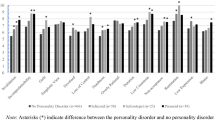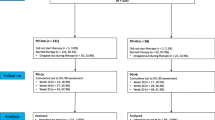Abstract
The original version of the Schema Questionnaire was developed by Young to measure early maladaptive schemas. These maladaptive schemas are thought to be important in the development and maintenance of psychiatric symptoms, such as anxiety and depression. Factor analytic research with this 205-item version of the Schema Questionnaire has supported the schemas proposed by Young. The Schema Questionnaire—Short Form (SQ-SF) was designed (J. E. Young, 1998) to measure 15 maladaptive schemas and is a briefer (75 item) instrument. The present study examined the psychometric properties of the SQ-SF with a sample of patients in a psychiatric day treatment program. The factor analysis supported the 15 schema subscales proposed by Young. These 15 subscales demonstrated good internal consistency. The present study also examined the relationship between the SQ-SF subscales and psychiatric symptomatology. Results provided support for the construct validity of the SQ-SF, suggesting the importance of maladaptive schemas in the development and maintenance of psychiatric symptoms.
Similar content being viewed by others
REFERENCES
American Psychiatric Association. (1994). Diagnostic and statistical manual of mental disorders (4th ed.). Washington, DC: Author.
Beck, A. T. (1976). Cognitive therapy and the emotional disorders. New York: International Universities Press.
Beck, A. T., Freeman, A., & Associates. (1991). Cognitive therapy of personality disorders. New York: Guilford Press.
Derogatis, L. R. (1993). Brief Symptom Inventory (BSI): Administration, scoring and procedures manual (3rd ed.). Minneapolis: National Computer Systems.
Gorsuch, R. L. (1983). Factor analysis (2nd ed.). Hillsdale, NJ: Lawrence Erlbaum.
Lee, C. W., Taylor, G., & Dunn, J. (1999). Factor structure of the schema questionnaire in a large clinical sample. Cognitive Therapy and Research, 23, 441–451.
McGinn, L. K., & Young, J. E. (1996). Schema-focused therapy. In P. M. Salkauskis (Ed.), Frontiers of cognitive therapy (pp. 182–207). New York: Guilford Press.
Muran, J. C. (1991). A reformulation of the ABC model in cognitive psychotherapies: Implications for assessment and theory. Clinical Psychology Review, 11, 399–418.
Muran, J. C., Samstag, L. W., Segal, Z. V., & Winston, A. (1998). Interpersonal scenarios: An idiographic measure of self-schemas. Psychotherapy Research, 8(3), 321–333.
Riskind, J. H., Williams, N. L., Gessner, T. L., Chrosniak, L. D., & Cortina, J. M. (2000). The looming maladaptive style: Anxiety, danger and schematic processing. Journal of Personality and Social Psychology, 79, 837–852.
Schmidt, N. B., Joiner, T. E., Young, J. E., & Telch, M. J. (1995). The Schema Questionnaire: Investigation of psychometric properties and the hierarchical structure of a measure of maladaptive schemas. Cognitive Therapy and Research, 19, 295–321.
Segal, Z.V. (1988). Appraisal of the self-schema construct in cognitive models of depression. Psychological Bulletin, 103(2), 147–162.
Segal, Z. V., & Shaw, B. F. (1986). Cognition in depression: A reappraisal of Coyne and Gotlib's critique. Cognitive Therapy and Research, 10, 671–693.
Stevens, J. (1986). Applied multivariate statistics for the social sciences. Hillsdale, NJ: Lawrence Erlbaum.
Welburn, K., Dagg, P., Coristine, M., & Pontefract, A. (2000). Schematic change as a result of an intensive group-therapy day-treatment program. Psychotherapy, 37(2), 189–195.
Young, J. E. (1998). Young Schema Questionnaire Short Form (1st ed.). New York: Cognitive Therapy Center.
Young, J. E., & Brown, G. (1994). Young Schema Questionnaire. In J. E. Young (Ed.), Cognitive therapy for personality disorders: A schema-focused approach. (Rev. ed., pp. 63–76). Sarasota, FL: Professional Resource Exchange.
Author information
Authors and Affiliations
Rights and permissions
About this article
Cite this article
Welburn, K., Coristine, M., Dagg, P. et al. The Schema Questionnaire—Short Form: Factor Analysis and Relationship Between Schemas and Symptoms. Cognitive Therapy and Research 26, 519–530 (2002). https://doi.org/10.1023/A:1016231902020
Issue Date:
DOI: https://doi.org/10.1023/A:1016231902020




